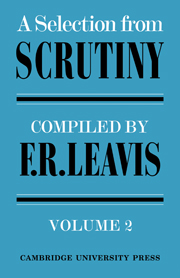1 - JANE AUSTEN
A Critical Theory Of Jane Austen's Writings (I)
Published online by Cambridge University Press: 04 August 2010
Summary
It is common to speak of Jane Austen's novels as a miracle; the accepted attitude to them is conveniently summarized by Professor Caroline Spurgeon in her address on Jane Austen to the British Academy:
But Jane Austen is more than a classic; she is also one of the little company whose work is of the nature of a miracle … That is to say, there is nothing whatever in the surroundings of these particular writers [Keats, Chatterton, Jane Austen, Emily Brontë], their upbringing, opportunities or training, to account for the quality of their literary work.
The business of literary criticism is surely not to say ‘ Inspiration’ and fall down and worship, and in the case of Jane Austen it is certainly not entitled to take up such an unprofitable attitude. For in Jane Austen literary criticism has, I believe, a uniquely documented case of the origin and development of artistic expression, and an enquiry into the nature of her genius and the process by which it developed can go very far indeed on sure ground. Thanks to Dr Chapman's labours we have for some time had at our disposal a properly edited text of nearly all her surviving writings, and scholarship, in his person chiefly, has brilliantly made out a number of interesting facts which have not yet, however, been translated into the language of literary criticism.
- Type
- Chapter
- Information
- A Selection from Scrutiny , pp. 1 - 80Publisher: Cambridge University PressPrint publication year: 1968
- 1
- Cited by



